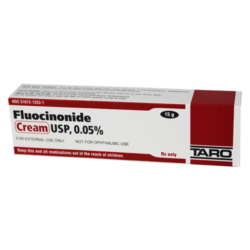Top Class Actions’s website and social media posts use affiliate links. If you make a purchase using such links, we may receive a commission, but it will not result in any additional charges to you. Please review our Affiliate Link Disclosure for more information.

The complaint asserts that generic manufacturers Teva Pharmaceuticals USA Inc., Taro Pharmaceuticals USA Inc., Sandoz Inc., Fougera Pharmaceuticals Inc., and Actavis Holdco US Inc. conspired with each other to artificially fix the price of multiple generic drugs to obtain more profits.
The antitrust class action lawsuit states that fluocinonide is a anti-inflammatory medication that is most often applied topically as a cream to treat skin conditions like dermatitis and psoriasis.
The complaint claims that fluocinonide has been on the marklet since the 1970s, and multiple generic versions of the drug lowered the price to “less than a dollar per gram.”
This makes sense, the class action contends, because generic versions of a drug are much cheaper to make, and typically more manufacturers means more competition and lower prices.
However, since 2014 the price of the skin ointment has increased by more than 200 percent, according to the class action. This price increase, as well as similar increases in other drugs, has led to multiple investigations and actions filed by federal and state attorneys general.
The complaint states that criminal and civil actions have been filed against several manufacturers of different generic drugs for violations of federal and state antitrust laws.
The fluocinonide generic manufacturer class action alleges similar claims here. According to the complaint, several factors indicate that the defendants have conspired to fix drug prices higher than they otherwise should be.
First, Teva, Taro, Sandoz, and Actavis are part of the handful of manufacturers of fluocinonide. Second, these defendants meet frequently at trade association conferences. Third, there are significant barriers for another competitor entering this market.
Fourth, demand for fluocinonide is steady. Finally, the prices for various versions of fluocinonide uniformly doubled around August and September of 2014, and have remained high ever since.
The class action argues that there are no market reasons for this price increase, so the only reason for the sudden price increase and stable price afterwards is collusion between the manufacturers.
Plaintiff UFCW Local 1500 Welfare Fund (“Fund”) states that it is an employee welfare benefits fund that has roughly 23,000 members. The Fund claims that it has paid some or all of the price of fluocinonide for its members, and would have paid less absent of the defendants’ conspiracy.
The antitrust lawsuit requests certification of a Class of all resident of “Alabama, Arizona, California, Florida, Hawaii, Iowa, Kansas, Massachusetts, Maine, Michigan, Minnesota, Mississippi, Nebraska, Nevada, New Mexico, New York, North Carolina, North Dakota, Oregon, Rhode Island, South Dakota, Tennessee, Utah, Vermont, West Virginia, Wisconsin, and the District of Columbia” who indirectly purchased fluocinonide for personal use.
The class action seeks restitution and treble damages for these Class Members. In addition, on behalf of all purchasers in the U.S., the complaint seeks an injunction prohibiting these high prices for the drug.
The Fund is represented by Gregory S. Asciolla, Jay L. Himes, Karin E. Garvey, Domenico Minerva, Robin A. Van Der Meulen, Matthew J. Perez, and Rudi Julius of Labaton Sucharow LLP, and Roberta D. Liebenberg, Paul Costa, and Adam J. Pessin of Fine, Kaplan and Black RPC.
The Teva, Actavis, Taro Price-Fixing Class Action Lawsuit is UFCW Local 1500 Welfare Fund v. Actavis Holdco US Inc., et al., Case No. 1:16-cv-09792, in the U.S. District Court for the Southern District of New York.
ATTORNEY ADVERTISING
Top Class Actions is a Proud Member of the American Bar Association
LEGAL INFORMATION IS NOT LEGAL ADVICE
Top Class Actions Legal Statement
©2008 – 2024 Top Class Actions® LLC
Various Trademarks held by their respective owners
This website is not intended for viewing or usage by European Union citizens.















4 thoughts onTeva, Actavis, Taro Face Price-Fixing Class Action Lawsuit
I take this medicine cream for psoriasis and hear nothing about this claim. I been taken it for many years.
Please add my name to this law suit.
Who do I contact about this if I believe I am a member?
The case is still moving through the courts and has not yet reached a settlement. Claim forms are usually not made available to consumers until after a court approved settlement is reached. We recommend you sign up for a free account at TopClassActions.com and follow the case. We will update the article with any major case developments or settlement news! Setting up a free account with Top Class Actions will allow you to receive instant updates on ANY article that you ‘Follow’ on our website. A link to creating an account may be found here: https://topclassactions.com/signup/. You can then ‘Follow’ the article above, and get notified immediately when we post updates!